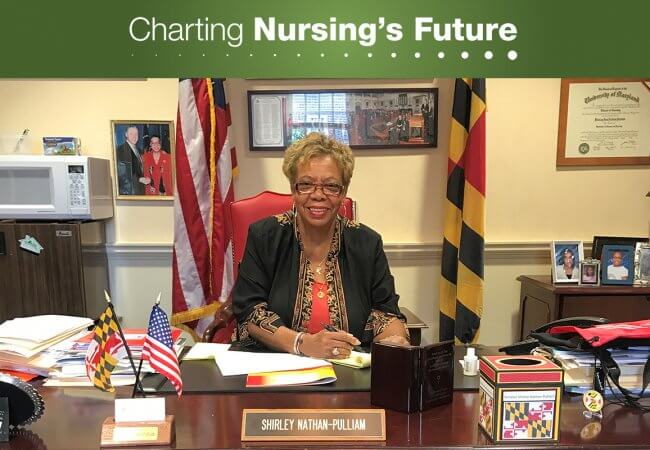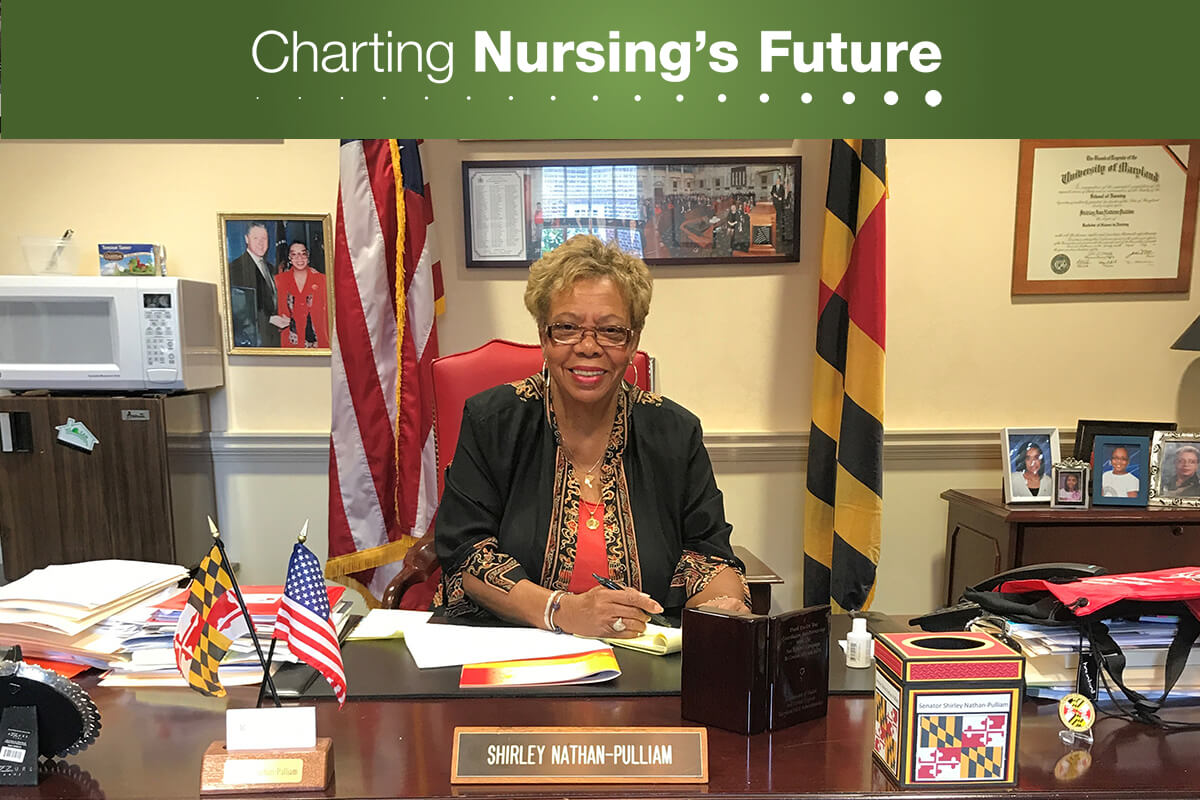
Jun 26, 2018
Shirley Nathan-Pulliam: A Nurse Turned Maryland Legislator
 Shirley Nathan-Pulliam, RN, BSN, MAS, grew up in Jamaica, began her nursing studies in England, and then settled in Baltimore, Maryland. Since 2014, she has represented District 44, which includes parts of Baltimore County and Baltimore City, in the Maryland Senate. She spent the previous 20 years in the state’s House of Delegates. Charting Nursing’s Future met with her at her district headquarters, where she talked about what led her to seek public office and how her nursing perspective has shaped her work as a legislator.
Shirley Nathan-Pulliam, RN, BSN, MAS, grew up in Jamaica, began her nursing studies in England, and then settled in Baltimore, Maryland. Since 2014, she has represented District 44, which includes parts of Baltimore County and Baltimore City, in the Maryland Senate. She spent the previous 20 years in the state’s House of Delegates. Charting Nursing’s Future met with her at her district headquarters, where she talked about what led her to seek public office and how her nursing perspective has shaped her work as a legislator.
What set you on a path toward public service?
As a nurse you see the conditions of patients coming into your facility. You see the pain. You see those with insurance and those without insurance, those struggling. And I always said, “There ought to be a law against this.”
One day I was helping bathe a patient with a fractured rib, and as I went to wash under her axilla, I felt her breast. It was hard as stone, and I looked at her and I said, “How long has your breast been like this?” She said, “For quite some time, but I had no health insurance, and I didn’t know what to do.” I watched her lose the first breast, the second breast, through chemo and radiation until the day she died, and I swore then that I was going to run for political office.
Who helped you along the way?
What helped me was my involvement in organizations. I was a founder of the Community College of Baltimore County Nursing Alumni Association, and I joined everything. I was a member of the National Black Nurses Association, the American Nurses Association, and the Maryland Nurses Association. I was involved with the Congressional Black Caucus Health Braintrust, and the Black Congress on Health, Law and Economics, and then I came to Baltimore and started the Legislative Black Caucus of Maryland.
Then I co-founded the Black Mental Health Alliance, and in the meantime, I served on the board of Planned Parenthood of Maryland. I served on the board of House of Ruth in DC [a shelter for women and children], so I was very much involved in my community.
What accomplishments are you most proud of?
Oh, wow, after 24 years, I have a lot of things that I’m proud of! One of the first things that I was very most proud of was getting $2.6 million, back in 1998, for breast cancer diagnosis and treatment for low-income women. That was my first big fight, which I took on with my committee chair.
Then, right after that, we secured $500,000 towards oral cancer diagnosis and treatment for men living on the street and underserved. Fast forward to 2003, my bill created a plan to address racial and ethnic disparities in the State of Maryland, and, in 2004, my bill, House Bill 86, created the Office of Minority Health and Health Disparities within the Maryland Department of Health. I was most proud of that because I wanted to make sure it was in statute that, regardless of who the governor is or which party is in charge, that would be there to try to reduce the disease and death rate among African-Americans and other minorities.
You sponsored legislation, which was signed into law last year, to convene a workgroup on “Health in All Policies” that affect residents of your state. Building healthy communities for all is a priority of both the Robert Wood Johnson and AARP Foundations. Would you tell us about your bill?
What I wanted to see is that every department has a policy that speaks to health. If you’re in housing, I want a policy that speaks to lead, mold, asbestos, rodents, and all of the things that make somebody sick, okay? If it’s transportation, then I want to make sure there are vans that pick up folks for chemo or dialysis, or from day care. If you leave that person sitting on the sidewalk waiting to be picked up for dialysis, how does that affect their health?
What have been your biggest disappointments?
My biggest disappointment right now is the dismantling of the Affordable Care Act. I thought we could fix it, not do all the things that we are doing to demolish it. I worked with U.S. Sen. Ben Cardin (D-MD) and others on an amendment that went into the Affordable Care Act to address racial and ethnic disparities. The amendment established six new federal offices on minority health (Agency for Healthcare Research and Quality, Centers for Disease Control and Prevention, Centers for Medicare and Medicaid Services, Food and Drug Administration, Health Resources and Services Administration, and Substance Abuse and Mental Health Services Administration) and strengthened their eligibility for funding.
How has your background as a nurse shaped your priorities and influenced your ability to get things done?
As a nurse, you’re taught the nursing process, and I use that same nursing process when I’m listening to testimony, when I’m analyzing. It speaks to assessment, so you’re going to identify the problem. You’re going to plan. You’re going to implement some change. You’re going to come back and evaluate.
My personality probably lends itself to working well with colleagues. You don’t get anything done unless you’re able to build relationships, and I have been fortunate to do just that. I’m a hugger. I love to talk. I love to shake hands. I love to get to know people, so whatever side of the aisle you’re on, I always find somebody that can work with me.
Note: Interview has been edited for space and clarity.
